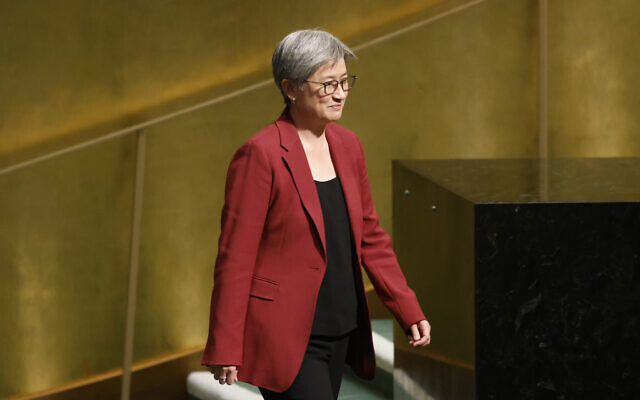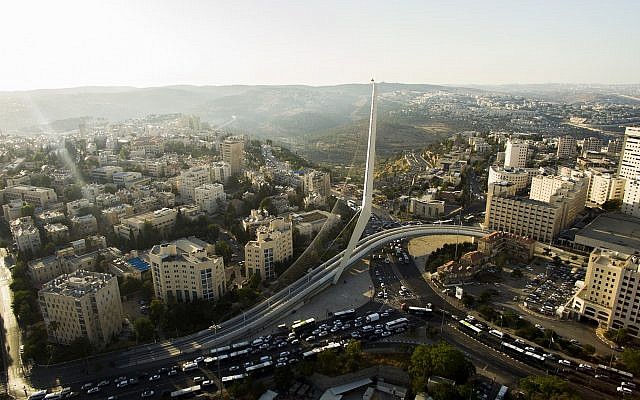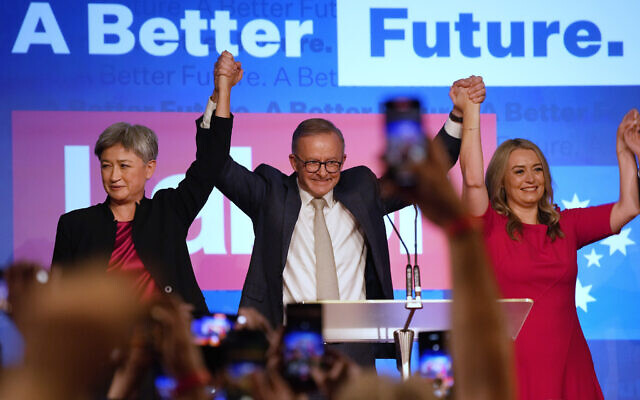FM Penny Wong says Australian embassy to remain in Tel Aviv, walks back 2018 decision by previous government to offer formal recognition after first denying policy change

SYDNEY, Australia — Australia said Tuesday it would no longer recognize West Jerusalem as Israel’s capital, reversing a 2018 decision by the previous conservative government.
Foreign Minister Penny Wong said the city’s status should be decided through peace talks between Israelis and Palestinians, and not through unilateral decisions.
“We will not support an approach that undermines (a two-state solution),” she said, adding: “Australia’s embassy has always been, and remains, in Tel Aviv.”
Wong had earlier denied that there was a policy change, saying via a spokesperson that “the former government made the decision to recognize West Jerusalem as the capital of Israel” and that “no decision to change that has been made by the government.”
But just hours later, the foreign minister, a member of the ruling Labor Party, said the decision four years ago by a conservative government led by Scott Morrison “caused conflict and distress in part of the Australian community, and today the government seeks to resolve that,” Wong said on Tuesday
Wong accused the Morrison government of being motivated by a crucial by-election in a beach-side Sydney suburb with a sizable Jewish community. “You know what this was? This was a cynical play, unsuccessful, to win the seat of Wentworth and a by-election,” she said.
The 2018 decision also caused consternation in neighboring Indonesia — the world’s most populous Muslim-majority country — temporarily derailing a free trade deal.

Both Israel and the Palestinians claim Jerusalem as their capital. Israel captured East Jerusalem from Jordan in the 1967 Six-Day War and later annexed it in a move never recognized by the international community. For decades the international community maintained that the city’s status should be negotiated between Israel and the Palestinians. Critics argue that declaring Jerusalem the capital of either inflames tensions and prejudges the outcome of final status peace talks.
Wong insisted Tuesday that the decision did not signal any hostility to Israel. “Australia will always be a steadfast friend of Israel. We were amongst the first countries to formally recognize Israel,” she said.
“We will not waver in our support of Israel and the Jewish community in Australia. We are equally unwavering in our support of the Palestinian people, including humanitarian support,” she said.
Canberra’s decision is unlikely to come as surprise to the Israeli government, though there was some confusion since the British newspaper The Guardian reported on Monday that the Australian Department of Foreign Affairs had removed text surrounding the recognition of West Jerusalem from its website.
The deleted text described “West Jerusalem as the capital of Israel” and noted that Australia “looks forward to moving its embassy to West Jerusalem when practical, in support of, and after the final status determination of, a two-state solution.”
The foreign ministry website still includes the bipartisan position that Australia “is committed to a two-state solution in which Israel and a future Palestinian state coexist, in peace and security, within internationally recognized borders.”
According to The Guardian, the site was updated after the British newspaper approached the Department of Foreign Affairs regarding the government’s view on the status of Jerusalem.
The center-left Labor party, with Anthony Albanese as prime minister and Wong as foreign minister, came to power in May 2022. The party had vowed to reverse Canberra’s move in 2018 under Morrison of the Liberal Party of Australia to recognize the western part of Jerusalem as the Israeli capital, if elected.

Wong, as an opposition senator in 2018, said that the center-left Labor Party “does not support unilateral recognition of Jerusalem as the capital of Israel and in government would reverse this decision.”
A spokesperson for Morrison said a decision to reverse the recognition would be “disappointing,” Australia’s ABC News reported.
Jerusalem has yet to respond and there has been no comment from the Australian embassy in Israel.
Morrison’s decision in 2018 received a lukewarm reception in Israel at the time, with many politicians charging that the move did not go far enough, having not recognized the entirety of the city as the Jewish state’s capital, while keeping Australia’s embassy in Tel Aviv. The previous year, the United States under then-president Donald Trump recognized Jerusalem as Israel’s capital and later moved the American embassy there.
Last month, British Prime Minister Liz Truss told Prime Minister Yair Lapid that she is reviewing a relocation of the country’s embassy from Tel Aviv to Jerusalem.
As reported by The Times of Israel
